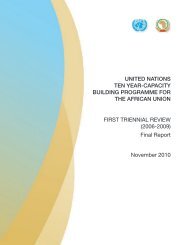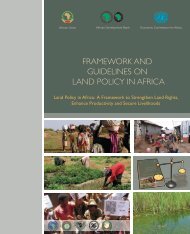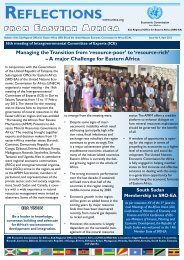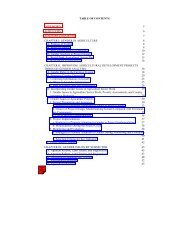A Decade of NEPAD - Economic Commission for Africa - uneca
A Decade of NEPAD - Economic Commission for Africa - uneca
A Decade of NEPAD - Economic Commission for Africa - uneca
Create successful ePaper yourself
Turn your PDF publications into a flip-book with our unique Google optimized e-Paper software.
64 A <strong>Decade</strong> <strong>of</strong> <strong>NEPAD</strong>: Deepening <strong>Africa</strong>n Private Sector and Civil Society Ownership and Partnership<br />
voting processes, but still desire access to contribute to<br />
the work <strong>of</strong> the <strong>Africa</strong>n Union. Many <strong>of</strong> these institutions<br />
also have doubts that their interests and concerns will not<br />
be adequately addressed through the elected country and<br />
regional ECOSOCC representatives.<br />
These two outcomes have led to the development, alongside<br />
ECOSOCC, <strong>of</strong> a primarily international CSO funded<br />
body called “The Centre <strong>for</strong> Citizens’ Participation in the<br />
<strong>Africa</strong>n Union” (CCP-AU) 79 . CCP-AU initially began as<br />
a task <strong>for</strong>ce in 2007 and was established with the mandate<br />
<strong>of</strong> coordinating and facilitating the activities <strong>of</strong> AU<br />
interested Civil Society Organisations and to encourage<br />
others around the continent to become engaged with the<br />
AU processes.<br />
The aim <strong>of</strong> its founding organization’s (which included<br />
Action Aid – Ethiopia, <strong>Africa</strong>n Center <strong>for</strong> Humanitarian<br />
Action (ACHA), <strong>Africa</strong>n Rally <strong>for</strong> Peace and Development<br />
(ARPD), Afr<strong>of</strong>lag Youth Vision (AYV), Christian Relief and<br />
Development Association (CRDA), Organization <strong>for</strong> Social<br />
Justice in Ethiopia (OSJE), and Oxfam) was to establish an<br />
institution that could serve as a plat<strong>for</strong>m to encourage the<br />
development <strong>of</strong> a people-centred <strong>Africa</strong>n Union – where<br />
citizens have a say and can take matters into their own<br />
hands and influence decisions made within the AU that<br />
eventually will affect them. CCP-AU also was established<br />
with the aim <strong>of</strong> broadening and strengthening opportunities<br />
<strong>for</strong> a sustainable and significant engagement between<br />
civil society organisations and the <strong>Africa</strong>n Union.<br />
The rationale behind the creation <strong>of</strong> the CCP-AU was<br />
multi-fold:<br />
ӹ There was a belief that there was yet untapped potential<br />
<strong>for</strong> <strong>Africa</strong>n civil society organisations to become involved<br />
with the AU, as mandated by its constitutive act;<br />
ӹ There was as yet unmet desire <strong>for</strong> engagement with the<br />
AU amongst <strong>Africa</strong>n CSOs;<br />
ӹ There were barriers to CSO engagement established by<br />
the AU, inadvertent or not; and<br />
ӹ There was a lack <strong>of</strong> an alternative established facilitating<br />
entity.<br />
Since its inception, the CCP-AU has taken steps to register<br />
its headquarters in Addis Ababa and already has facilitated<br />
a number <strong>of</strong> activities alongside AU programmes. The<br />
79 See www.ccp-au.org<br />
CCP-AU planned and conducted the Third and Fourth<br />
Citizens’ Continental Conferences in Sharm El Sheik,<br />
Egypt and Addis Ababa, Ethiopia, respectively.<br />
The Third Citizens Continental Conference was convened<br />
in June 2008 ahead <strong>of</strong> the 11 th Ordinary AU Summit under<br />
the Summit’s theme, “Meeting the Millennium Development<br />
Goals on Water and Sanitation”. Prior to this<br />
conference, the CCP-AU had organised and conducted a<br />
CSO training workshop from May 24-25 in Cairo, Egypt<br />
entitled “Understanding the AU and Seizing opportunities<br />
<strong>for</strong> Change” which was aimed at enhancing the knowledge<br />
and capacity <strong>of</strong> CSOs to engage the <strong>Africa</strong>n Union<br />
on diverse issues affecting <strong>Africa</strong>n citizenry. The Fourth<br />
Citizen’s Continental Conference was held at Addis Ababa<br />
on January 2009 where issues <strong>of</strong> social development and<br />
peace and security were discussed.<br />
As a groundbreaking initiative, CCP-AU launched a virtual<br />
working group project on March 5 th , 2009. The four<br />
working groups established include: 1) Institutional Re<strong>for</strong>m,<br />
2) Socio-<strong>Economic</strong> Issues, 3) AU Strategic Plan,<br />
and 4) International Justice and Universal Jurisdiction.<br />
47 members have signed up to participate in the working<br />
group initiative. As the lead facilitator and supporter, the<br />
CCP-AU intends to further assist the working groups<br />
through identification and dissemination <strong>of</strong> documents,<br />
setting up and facilitating meeting dates and other lobbying<br />
opportunities, and coordinating face to face meetings<br />
with the AU <strong>Commission</strong> or providing support in other<br />
ways as requested.<br />
In June 2009, the CCP-AU held its Fifth Continental Conference<br />
in Addis Ababa, Ethiopia with the principal themes<br />
<strong>of</strong> the conference being agriculture, food security and<br />
financing <strong>for</strong> development in <strong>Africa</strong>, and peace, security<br />
and human rights in <strong>Africa</strong>.<br />
Furthermore, participants discussed various strategies to<br />
popularise the AU among <strong>Africa</strong>n citizens and to identify<br />
and involve other stakeholders in engaging with the<br />
AU and its organs (i.e. the Pan <strong>Africa</strong>n Parliament, the<br />
<strong>Economic</strong>, Social and Cultural Council, and the <strong>Africa</strong>n<br />
Citizens Directorate, among others). Participants also<br />
agreed to put in place strategies to harmonise ef<strong>for</strong>ts <strong>of</strong><br />
CCP-AU and other civil society organisations working<br />
on and with the AU.







